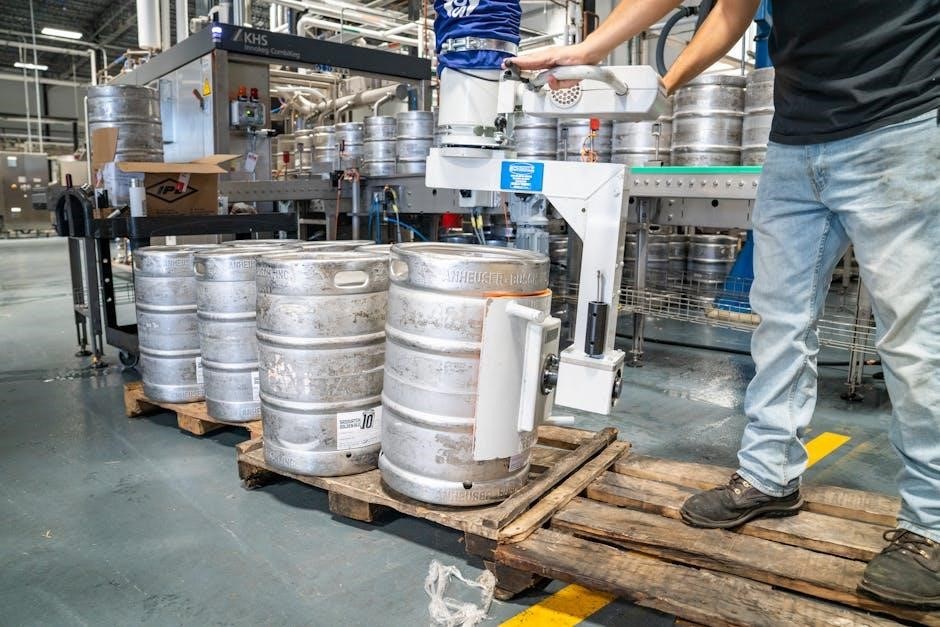Facility Manager Roles and Responsibilities: An Overview
A facility manager ensures buildings are safe, efficient, and compliant, optimizing space and reducing costs while supporting business operations behind the scenes․
Facility management is the coordination of physical spaces, services, and maintenance to support organizational efficiency․ It ensures buildings are safe, functional, and aligned with business goals․ This field encompasses maintenance, space planning, and compliance, playing a vital role in enhancing productivity and stakeholder satisfaction while managing operational risks and costs effectively․
Key Areas of Responsibility
Facility managers oversee building maintenance, space optimization, and compliance with regulations․ They manage budgets, reduce operational costs, and handle emergencies․ Collaboration with teams and vendors is crucial, alongside leveraging technology like CAFM and IoT for efficiency․ Sustainability and continuous improvement are also focal points, ensuring alignment with business objectives and fostering a safe, productive environment for all stakeholders․

Core Responsibilities of a Facility Manager
Facility managers oversee building maintenance, space optimization, and compliance, ensuring safe and efficient environments․ They handle emergencies, manage vendors, and leverage technology to support business operations effectively․
Maintenance and Upkeep of Facilities
A facility manager ensures buildings are maintained at optimal levels, addressing repairs, and scheduling regular inspections to prevent issues․ They enforce safety standards, manage maintenance teams, and handle urgent repairs to maintain functionality and compliance, ensuring a safe and efficient environment for occupants․
Space Utilization and Optimization

Facility managers optimize space to enhance efficiency, ensuring alignment with business goals․ They analyze space needs, implement flexible layouts, and leverage technology to maximize occupancy․ By improving space utilization, they reduce costs and boost productivity, creating an environment that supports operational excellence and employee satisfaction․
Skills and Qualifications Required
A facility manager needs strong technical knowledge, leadership skills, and experience in maintenance and operations․ They must be proficient in CAFM tools and understand regulatory compliance․
Effective communication, problem-solving, and budget management are essential․ A degree in facilities management or engineering is often preferred, along with certifications like CFM or FMP․
Technical Skills and Knowledge
A facility manager requires expertise in building systems, including HVAC, electrical, and plumbing․ Proficiency in Computer-Aided Facilities Management (CAFM) software is crucial for managing maintenance and space planning․ Knowledge of safety regulations, energy management, and sustainability practices is essential․ Familiarity with IoT and smart building technologies enhances operational efficiency and cost-effectiveness․ Technical skills ensure seamless oversight of facilities, supporting strategic business objectives․
Soft Skills for Effective Management
Strong communication and interpersonal skills are vital for a facility manager to collaborate with teams and stakeholders․ Leadership abilities ensure effective team motivation and guidance․ Problem-solving skills address operational challenges swiftly․ Adaptability and time management enable handling multiple tasks efficiently․ Emotional intelligence fosters a positive work environment, while negotiation skills aid in vendor and contractor relationships, ensuring smooth facility operations and alignment with organizational goals․
Strategic Planning and Alignment with Business Goals
Facility managers align facilities operations with organizational objectives, ensuring spaces support productivity and efficiency while integrating with long-term business strategies and resource management plans effectively․
Developing Operational Plans
Facility managers create detailed operational plans, outlining maintenance schedules, resource allocation, and team tasks to ensure seamless facility operations․ These plans align with organizational goals, optimize efficiency, and prepare for future challenges, ensuring all activities support the company’s strategic objectives effectively․ Regular updates and reviews are conducted to maintain relevance and adapt to changing needs and priorities․
Ensuring Compliance with Regulations
Facility managers ensure adherence to legal, health, and safety standards, conducting regular audits to verify compliance․ They monitor updates in regulations and implement necessary changes, ensuring all operations align with current laws․ This includes maintaining required documentation and training staff to uphold compliance, safeguarding the organization from potential legal risks and ensuring a safe working environment for all occupants and employees․

Facility Manager Roles in Budgeting and Cost Control
Facility managers prepare and manage budgets, ensuring cost-effective operations․ They optimize resource allocation and implement financial planning strategies to reduce expenses while maintaining facility performance and organizational goals․
Preparing and Managing Budgets
Facility managers are responsible for preparing and managing budgets to ensure cost-effective operations․ They oversee financial planning, allocate resources efficiently, and implement cost-control measures․ By analyzing expenses and identifying savings opportunities, they optimize spending while maintaining high facility performance․ Their role ensures that budget allocations align with organizational goals and operational requirements, supporting long-term financial sustainability and efficiency․
Reducing Operational Costs
Facility managers play a crucial role in minimizing operational expenses by implementing efficient practices․ They analyze energy consumption, optimize resource usage, and negotiate vendor contracts to lower costs․ By adopting sustainable solutions and leveraging technology, they ensure cost-effectiveness without compromising service quality or safety․ Effective cost reduction strategies enable organizations to allocate resources more strategically, enhancing overall profitability and operational efficiency․
Risk Management and Emergency Preparedness
Facility managers identify and mitigate risks, ensuring compliance with safety regulations․ They develop emergency response plans to address potential threats, safeguarding assets and ensuring business continuity․
Identifying and Mitigating Risks
Facility managers systematically identify potential risks such as safety hazards, equipment failures, and natural disasters․ They implement proactive measures like regular inspections, safety training, and contingency planning to mitigate these risks․ By addressing vulnerabilities early, they ensure a safe working environment, minimize disruptions, and protect the organization’s assets and reputation․ Effective risk management is crucial for operational continuity․
Developing Emergency Response Plans
Facility managers create comprehensive emergency response plans to address crises like fires, natural disasters, or system failures․ These plans include evacuation procedures, communication protocols, and coordination with emergency services․ Regular drills and training ensure preparedness, while continuous updates keep the plans relevant․ The goal is to minimize risks, protect occupants, and restore operations quickly, ensuring safety and business continuity․

Facility Manager Roles in Team Collaboration
Facility managers collaborate with cross-functional teams, fostering communication and alignment with organizational goals to ensure seamless operations and maintain a safe, efficient work environment․
Working with Cross-Functional Teams
Facility managers collaborate with cross-functional teams, including HR, IT, and operations, to ensure alignment with organizational goals․ They optimize space, improve workflows, and maintain safety standards․ By fostering open communication and active participation, facility managers enhance teamwork, ensuring seamless operations and a productive work environment that supports business objectives effectively․
Managing Vendor and Contractor Relationships
Facility managers oversee vendor and contractor activities, ensuring compliance with regulations․ They negotiate contracts, monitor performance, and ensure services meet quality standards․ Effective communication and relationship management are key to resolving issues promptly and maintaining positive partnerships․

Technology and Tools in Facility Management
Facility managers leverage tools like Computer-Aided Facilities Management (CAFM) and IoT-enabled systems for real-time monitoring, enhancing efficiency, and optimizing resource utilization in buildings․
Computer-Aided Facilities Management (CAFM)
CAFM systems streamline facility management operations, enabling efficient space management, maintenance scheduling, and asset tracking․ These tools enhance operational efficiency, reduce costs, and improve decision-making through real-time data and analytics, supporting facility managers in optimizing resource utilization and ensuring compliance with organizational goals․
IoT and Smart Building Technologies
IoT and smart building technologies enhance facility management by enabling real-time monitoring, automation, and data-driven decision-making․ These tools optimize energy consumption, improve maintenance efficiency, and ensure a safer, more comfortable environment․ By integrating sensors and analytics, facility managers can proactively address issues, reduce operational costs, and align with sustainability goals, creating smarter, more adaptive spaces for occupants․
Facility Manager Roles in Sustainability and Energy Efficiency
Facility managers drive sustainability by conducting energy audits, implementing green technologies, and strategically optimizing resource use, reducing environmental impact and operational costs while fostering eco-friendly environments․
Implementing Sustainable Practices
Facility managers play a crucial role in promoting sustainability by implementing eco-friendly practices, such as energy-efficient lighting, waste reduction programs, and water conservation measures․ They conduct regular audits to identify areas for improvement and ensure compliance with environmental regulations․ By leveraging technology like CAFM and IoT, they optimize resource use, reducing the organization’s carbon footprint while maintaining operational efficiency and cost-effectiveness․
Enhancing Energy Efficiency
Facility managers enhance energy efficiency by conducting energy audits, upgrading to energy-efficient equipment, and implementing smart technologies․ They monitor energy consumption patterns and optimize systems to reduce waste․ By leveraging IoT and automation, they ensure compliance with energy standards, lowering operational costs and the organization’s environmental impact while maintaining comfort and productivity levels across facilities․

Facility Manager Roles in Continuous Improvement
Facility managers drive continuous improvement by conducting audits, evaluating performance, and implementing feedback to enhance operations, ensuring alignment with industry standards and organizational goals effectively․
Conducting Regular Audits and Inspections
Facility managers conduct regular audits and inspections to ensure compliance with safety standards, identify maintenance needs, and assess operational efficiency․ These activities help in early detection of potential issues, allowing proactive measures to prevent downtime and improve overall facility performance․ Audits also ensure adherence to legal requirements and support continuous improvement initiatives, maintaining a safe and productive environment for occupants․
Adopting Best Practices in Facility Management
Facility managers adopt best practices to enhance operational efficiency, reduce costs, and ensure sustainability․ This includes implementing standardized processes, leveraging industry benchmarks, and staying updated on emerging trends․ By aligning with recognized standards, they improve space utilization, emergency preparedness, and compliance, ultimately contributing to organizational goals and operational excellence․
